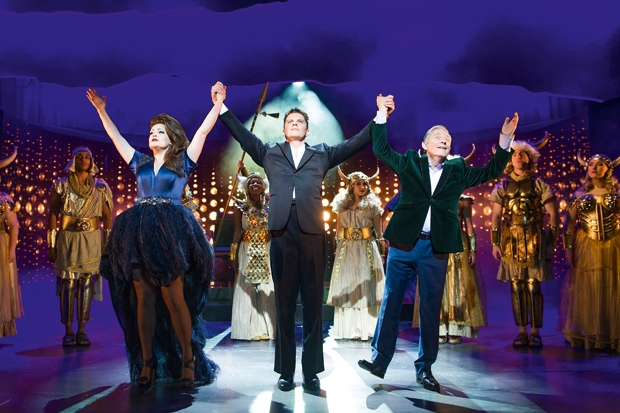I Can’t Sing! is a parody of The X Factor, which already parodies itself at every turn. Quite a tough call. The heroine is an oppressed no-hoper stuck in a tiny caravan under the Westway with her crippled dad who lives in an iron lung. She longs for a chance to win stardom and wealth on a TV talent show. So this is the Cinderella story with a lot of grotesque and absurd modern detailing. Is it good? No. It’s spectacularly brilliant.
A hit musical needs to get everything right and this one does just that. The sets are lavish and sumptuous. The costumes are razor-sharp parodies of underclass loser-wear. The title song has a soaring climax that tugs at the heart-strings and fills the spirit with strange and unexpected yearnings. Some reviewers have found the show cruel. I disagree. One of the wannabe singers is a hunchback, whose distended vertebrae have hardened into a ridge as large as a pedal bin. This exaggeration prevents the viewer from accusing himself of mocking invalidity. And the hunchback’s character is believable and enjoyable. He’s playful, cocky and slightly malicious but he’s also supremely self-assured. Manifestly he is not a victim.
Touches like this suggest that the show has been shaped with great discretion and sensitivity. At the same time it’s joyously crass and exuberant. The writer, Harry Hill, crams the script full of zany, wise-child gags. One example. Our heroine learns by phone that’s she’s been accepted for Boot Camp. ‘I’m going to London!’ she screams. ‘You’re in London,’ deadpans her boyfriend. Hill knows just how to target a family audience and the script is free of swearing or sexual innuendo. This will vastly increase its customer base. Kids of five would love it. And they’d get it, too. Basically it’s an upmarket panto with strong tunes, incisive caricature and a rolling conveyor belt of top-quality jokes.
Will it be around in a year’s time? Definitely. Make that three. Yet plenty of critics have been reluctant to award it the five-star salute it deserves. No doubt Simon Cowell’s involvement as co-producer is responsible. Cowell, according to the theorists, is trying to neutralise criticism by pre-emptively satirising his role in the music industry. The show must therefore represent a new front in the evil maniac’s deranged scheme to destroy popular music by stamping out talent and replacing it with Xeroxed inauthenticity. A tempting idea but not convincing.
Cowell has propelled a few dozen biddable puppets to stardom but his influence has created parallel opportunities for acts who claim to express the raw and urgent voice of rebellion and heresy. Cowell is far from being a malignant virus that seeks to gobble up the entire world. He isn’t even new. The scale of his operations may be ground-breaking but the phenomenon of manufactured pop is older than The Monkees. Judy Garland wasn’t spotted playing a ukulele in a Chicago strip joint. When Shirley Temple broke through at the age of three she hadn’t spent a tough decade ‘paying her dues’ on the indie circuit. All musical acts are factory-made to some extent. Cowell’s offence is to have surpassed his predecessors in efficiency. He’s thorough. Which is hardly a crime.
Soho Theatre welcomes back Bitch Boxer after a successful run last year. We meet Chloe, an East End geezer-bird, who wants to make it in a man’s sport. She faces additional troubles from her ailing dad, her hectoring coach and her wet-fish boyfriend. Actor Holly Augustine has the perfect build: she’s tall, with slim hips and a narrow waist, and her breasts are gagged and flattened by a sports bra. She skilfully conveys the foul-mouthed lairiness and the self-dramatising sentimentality of the boxing trade. Is she too abrasive to be charming? Perhaps. Certainly her character lacks intelligence. Here’s her response to falling in love. ‘Loif surproise izyuh.’ Not quite Montaigne.
The script requires Augustine to play both herself and a handful of minor characters who have no distinctive habits of thought or expression. They’re all Chloe clones. And the staging is crude. Augustine has to suggest a competitive boxing match, which is rather hard for a soloist hopping and skipping around a make-believe ring, jabbing her fists at nothing at all and then tumbling to the floor when nothing at all clobbers her back. It looks forced and peculiar. But the real disappointment is that Chloe has no political education. A female pugilist, or pugiliste, should be an emblem of pride, defiance and autonomy, but Chloe defines herself in relation to her dad, her boyfriend and her trainer. Spot the snag? All men. My inner feminist was left reeling by this bitter blow. Only after sprinting home and rereading my signed copy of The Whole Woman was I convinced there might still be hope.







Comments